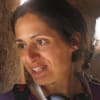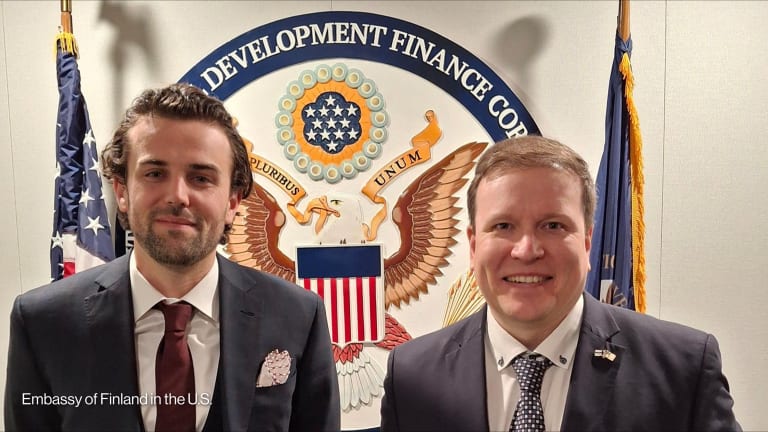Q&A: IFAD president on bringing evidence to policymaking
Gilbert Houngbo, the new president of the International Fund for Agricultural Development, talks to Devex about how the organization tries to instill a systemic use of evidence in policymaking in the countries where it works — but says local buy-in can be just as important.
LONDON — You’d be hard-pressed to find the International Fund for Agricultural Development when you first land in a developing country, according to Gilbert Houngbo, the organization’s president. You’ll need to go past the cities and the towns, he said, into the most remote areas. This reflects the agency’s focus on the rural poor, who bear the brunt of hunger and poverty. Houngbo took over the presidency of IFAD — a U.N. agency that provides low-cost financing to remote rural communities through government loans — in April 2017, following posts with other U.N. agencies and four years as Togo’s prime minister. On October 31, he paid a visit to the United Kingdom Parliament for a talk with the All-Party Parliamentary Group on Agriculture. Far from the remote corners where IFAD works — and in the presence of the U.K.’s Department for International Development, one of IFAD’s funders — Houngbo spoke about worrying trends on global hunger that call for scaling up interventions with local buy-in, and IFAD’s efforts to instill a rigorous use of evidence in policymaking in the countries where it works. The conversation here has been edited for length and clarity. This year’s State of Food Security and Nutrition report documents a rising number of people suffering hunger globally. Do you think it is a blip or the reversal of a trend? This is a very rigorous report — you have five agencies that put in an effort, the Food and Agriculture Organization in the leading role but bringing in IFAD, the World Food Programme, UNICEF, and the World Health Organization producing it. I want to believe that it's a blip. But we are very concerned that it's a reversal. What is quite troubling is that most of those 44 countries where the situation has worsened are going through some kind of fragility, whether it's man-made or a natural disaster. The protracted crisis dimension is the worrisome part. Obviously I would like next year's report to prove that it's not a reversal. So to do that, it's now that we need to step up our interventions and our actions. You mentioned a department of strategy and knowledge management that IFAD created two to three years ago. What is the rationale behind that? If you're not careful, sometimes you can go fast and then find years down the road that there's no ownership. --— Gilbert Houngbo, IFAD president One is to be able to do the analysis, the research, for us to come up with the 10-year strategy plan, and deciding where we're going to focus in the coming cycle of our replenishment of the budget. The second dimension is the whole measurement of the impact of what you're doing. It's important to be able to come with a methodology, models that will be credible and independent. You need to find the right balance between the [key performance] indicators you need for your management and your accountability to the public, but also to make sure that you do it from a value-for-money perspective — not to a point where producing those indicators becomes so costly that one can wonder if it's justified. Maybe the other dimension of that department is knowledge management: being able to harness all the lessons learned, from your successful projects as well as your failures — not only to share with other countries, but also to help a government going forward to form policy choices, and also taking that into account in your strategy in moving forward. How much of that evidence links to the conversations you have with governments on policy? Our involvement in policy choices happens when we prepare our 5-6 year plan, which we agree with the government, on what we're going to finance — which normally is extracted from the country's own national development plan. Then as you are implementing your projects, there are lessons learned. And the more you deal with the community at the base, the more you learn things, which sometimes the central government itself may not be conscious of. “From a governance perspective, you have to make it systemic.” --— So you have mechanisms in place for that learning to come in? Exactly. To bring that into the ministry of agriculture, to the ministry of finance, or the ministry of rural development — so they can adjust their own policies. But how much does that actually happen? Because a common complaint is that evidence doesn't make it into policy enough. From a governance perspective, you have to make it systemic. For as long as I was prime minister, every six months we needed to have this overall review of how we're going to implement our development plan, the lessons learned, and then to make it systemic — how that informs the choices of your coming cycle, starting from your following year's budget. If you don't make it systemic, it might happen only — and then not totally — once in a while. From an IFAD perspective, on an annual basis you have an opportunity to review the ongoing project activity with your contact point from the government. This is where you also need to bring in your lessons learned. For us the government is the implementing agency, so sometimes those lessons learned come actually from the government team. That being said, the danger in development is that, if you're not careful, sometimes you can go fast and then find years down the road that there's no ownership. So what happens sometimes is that you have a three-year strategy signed just because the consultant you brought in came to a conclusion and the government agreed — but does it agree because of an expert saying that's what you should do, or does it agree because it’s convinced? Sometimes it's better to take a bit of time to make sure that the communities are really convinced. “Sometimes it's better to take a bit of time to make sure that the communities are really convinced.” --— I was in Addis Ababa with the FAO and WFP and we went to a Somali region in the eastern part. One of the things that for us is a key challenge is water. But when you talk to the population there, for them water was number 2 or number 3. If you're not careful, you go ahead and have an irrigation project [and] it may not sustain — not because the need is not there, but because the ownership, being convinced, is critical. So feeding this back into policy may not happen. For me, very often, part of the problem is whether or not the government or the community or the civil servant in the country has really taken charge of the whole program to start with. What are your priorities? What isn't working about IFAD that you want to fix? For any institution, if I tell you there's nothing to improve, I will be intellectually dishonest. But globally, you see that IFAD is doing fairly well. And my point is: OK, knowing that development is not an easy business, is our time well spent to see what is not working and want to fix it? Instead let’s see what's working well and say: I want to do more, because of the demand on the ground. This year we are delivering $1.6 billion in loans and grants, compared to an average of $1.2 billion. That said, where I think we can do much more is where we have just been talking about: being able to bring more of our experience, our lessons learned, into policy. Read more Devex coverage on food security and agriculture.
LONDON — You’d be hard-pressed to find the International Fund for Agricultural Development when you first land in a developing country, according to Gilbert Houngbo, the organization’s president. You’ll need to go past the cities and the towns, he said, into the most remote areas. This reflects the agency’s focus on the rural poor, who bear the brunt of hunger and poverty.
Houngbo took over the presidency of IFAD — a U.N. agency that provides low-cost financing to remote rural communities through government loans — in April 2017, following posts with other U.N. agencies and four years as Togo’s prime minister. On October 31, he paid a visit to the United Kingdom Parliament for a talk with the All-Party Parliamentary Group on Agriculture.
Far from the remote corners where IFAD works — and in the presence of the U.K.’s Department for International Development, one of IFAD’s funders — Houngbo spoke about worrying trends on global hunger that call for scaling up interventions with local buy-in, and IFAD’s efforts to instill a rigorous use of evidence in policymaking in the countries where it works. The conversation here has been edited for length and clarity.
This story is forDevex Promembers
Unlock this story now with a 15-day free trial of Devex Pro.
With a Devex Pro subscription you'll get access to deeper analysis and exclusive insights from our reporters and analysts.
Start my free trialRequest a group subscription Printing articles to share with others is a breach of our terms and conditions and copyright policy. Please use the sharing options on the left side of the article. Devex Pro members may share up to 10 articles per month using the Pro share tool ( ).
Anita Makri is a freelance writer/journalist, producer, and editorial adviser specializing in global development and science in society, drawing from 25 years of experience across sectors. She is based in London and has produced stories from Africa, Latin America, and South Asia. Her work has been published in The Guardian, National Geographic, Nature, SciDev.Net, and Undark, among others. Before going freelance Anita held senior editorial positions and in 2020, founded WorldWise on Substack, a newsletter for discerning readers and producers of journalism on global issues.








